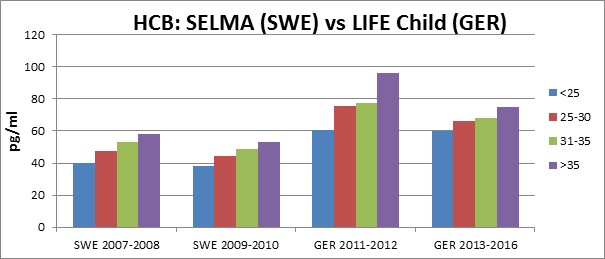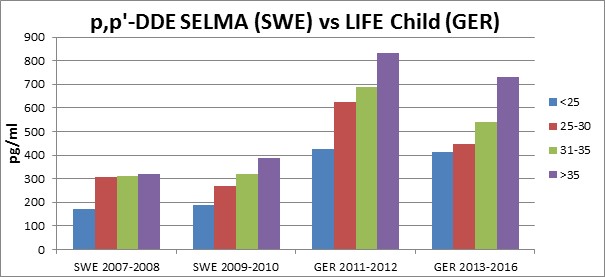Persistent organic pollutants (POPs) measured from samples of pregnancy cohorts
National Institute for Health and Welfare in Finland, THL, has analysed persistent organic pollutants (POPs) from samples of the two large pregnancy cohorts, SELMA and Life Child. POPs are organic chemical compounds which bioaccumulate in animals and humans. They include both 1) intentionally produced chemicals that are currently or were once used in agriculture, disease control, manufacturing, or industrial processes; and 2) unintentionally produced chemicals that are a result of some industrial processes or combustion.
THL’s chemical analysis group has measured 22 persistent organic pollutants (POPs) from 2373 SELMA serum samples from Sweden and 331 LIFE Child serum samples from Germany. Results of these samples have been used in statistical analysis to define which ones of these POPs are so-called “bad actors”, i.e. which ones are associated with adverse health effects addressed in this project. Those that were associated (hexachlorobenzene and p,p’-DDE) were added to experimental mixtures in concentration proportions that appeared in the serum samples of the pregnant women. The experimental mixtures will be further used in different cell and animal experiments to study their effects on sexual development, neurodevelopment and growth and metabolism.
Figures below show the comparison of HCB and p,p’-DDE in Swedish and German serum samples.
 Figure 1. Mean HCB concentrations in SELMA (SWE) and LIFE Child (GER) grouped by sampling years and age of the mothers.
Figure 1. Mean HCB concentrations in SELMA (SWE) and LIFE Child (GER) grouped by sampling years and age of the mothers.
Figure 2. Mean p,p’-DDE concentrations in SELMA (SWE) and LIFE Child (GER) grouped by sampling years and age of the mothers.
Hexachlorobenzene (HCB) has previously been used as pesticide and small amounts are still also formed as by-product of industrial processes and combustion, whereas p,p’-DDE is the major metabolite of classical pesticide p,p’-DDT. The use of both HCB and p,p’-DDT is banned under the Stockholm Convention but limited use of p,p’-DDT in disease vector control continues, because of its effectiveness in reducing malarial infections, balanced by environmental and other health concerns.


0 comments